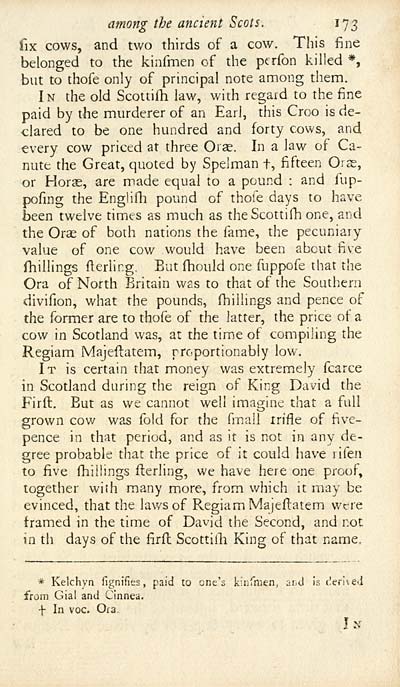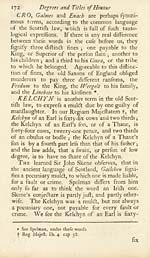Blair Collection > Critical dissertations on the origin, antiquities, language, government, manners, and religion, of the antient Caledonians, their posterity the Picts, and the British and Irish Scots
(211)
Download files
Complete book:
Individual page:
Thumbnail gallery: Grid view | List view

among the ancient Scots. J']^
fix cows, and two thirds of a cow. This fine
belonged to the kinfmen of the perfon killed *,
but to ihofe only of principal note among them.
In the old Scottilh law, with regard to the fine
paid by the murderer of an Earl, this Croo is de-
clared to be one hundred and forty cows, and
every cow priced at three Orse. In a law of Ca-
nute the Great, quoted by Spelman t, fifteen Oras,
or Horse, are made equal to a pound : and fup-
pofing the Englifli pound of thofe days to have
been twelve times as much as theScottifh one, and
the Orse of bodi nations the fame, the pecuniary
value of one cow would have been about five
fhillings flerlir.g. But fhould one fuppofe that the
Ora of North Britain was to that of the Southern
divifion, what the pounds, fhillings and pence of
the former are to thofe of the latter, the price of a
cow in Scotland was, at the time of compiling the
Regiam Majeftatem, rroportionably low.
It is certain that money was extremely fcarce
in Scodand during the reign of King David the
Firft. But as we cannot well imagine that a full
grown cow was fold for the fmall trifle of five-
pence in that period, and as it is not in any de-
gree probable that the price of it could have rifen
to five fhillings fterling, we have here one proof,
together with many more, from which it may be
evinced, that the lav/s of Pv.egiam Majeftatem were
framed in the time of David the Second, and not
in th days of the firft: Scottilli King of that name.
* Kelchyn fignifies , paid to one's kinfmen, ar.d Is derived
from Gial and Cinnea.
f In voc. Ora.
fix cows, and two thirds of a cow. This fine
belonged to the kinfmen of the perfon killed *,
but to ihofe only of principal note among them.
In the old Scottilh law, with regard to the fine
paid by the murderer of an Earl, this Croo is de-
clared to be one hundred and forty cows, and
every cow priced at three Orse. In a law of Ca-
nute the Great, quoted by Spelman t, fifteen Oras,
or Horse, are made equal to a pound : and fup-
pofing the Englifli pound of thofe days to have
been twelve times as much as theScottifh one, and
the Orse of bodi nations the fame, the pecuniary
value of one cow would have been about five
fhillings flerlir.g. But fhould one fuppofe that the
Ora of North Britain was to that of the Southern
divifion, what the pounds, fhillings and pence of
the former are to thofe of the latter, the price of a
cow in Scotland was, at the time of compiling the
Regiam Majeftatem, rroportionably low.
It is certain that money was extremely fcarce
in Scodand during the reign of King David the
Firft. But as we cannot well imagine that a full
grown cow was fold for the fmall trifle of five-
pence in that period, and as it is not in any de-
gree probable that the price of it could have rifen
to five fhillings fterling, we have here one proof,
together with many more, from which it may be
evinced, that the lav/s of Pv.egiam Majeftatem were
framed in the time of David the Second, and not
in th days of the firft: Scottilli King of that name.
* Kelchyn fignifies , paid to one's kinfmen, ar.d Is derived
from Gial and Cinnea.
f In voc. Ora.
Set display mode to: Large image | Transcription
Images and transcriptions on this page, including medium image downloads, may be used under the Creative Commons Attribution 4.0 International Licence unless otherwise stated. ![]()
| Permanent URL | https://digital.nls.uk/76288932 |
|---|
| Description | A selection of books from a collection of more than 500 titles, mostly on religious and literary topics. Also includes some material dealing with other Celtic languages and societies. Collection created towards the end of the 19th century by Lady Evelyn Stewart Murray. |
|---|
| Description | Selected items from five 'Special and Named Printed Collections'. Includes books in Gaelic and other Celtic languages, works about the Gaels, their languages, literature, culture and history. |
|---|

